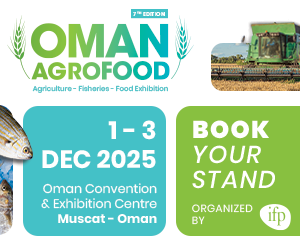Oman Flour Mills (OFM), one of the Sultanate’s largest food processing companies, is advancing plans to enter the insect farming sector as part of its strategy to produce sustainable protein for animal feed.
The initiative, first unveiled three years ago, is now in the preliminary assessment stage, according to the company’s Board of Directors’ report for the six months ending June 30, 2025.
“A desktop feasibility study has been completed for an insect meal manufacturing facility. The project aims to produce alternative protein from organic and poultry waste for use in animal feed,” said Ahmed bin Ali bin Sulaiman al Bulushi, Chairman of the Board.
Sustainable Protein Source
Insect meal—containing 40–70% protein depending on species and processing—is rich in amino acids, beneficial fats, vitamins, and minerals. It is considered a sustainable alternative to fishmeal and soy, requiring less land, water, and feed while reducing landfill use and emissions.
At a recent Muscat Stock Exchange roadshow, OFM confirmed it is exploring the farming of black soldier fly larvae (BSFL), the most widely used insect in global protein production. BSFL meal typically contains up to 50% crude protein and up to 35% lipids, with an amino acid profile comparable to fishmeal, making it suitable for poultry, aquaculture, and livestock feed.
Feed Division Drives Revenue
Animal feed is already a cornerstone of OFM’s business, contributing nearly half of total sales. Revenue from the Feed Mills division reached USD 94 million in the first half of 2025, accounting for 50.8% of company revenue.
Globally, the insect protein market is forecast to exceed USD 4–5 billion by 2030, driven by surging demand for sustainable protein sources.
New Ventures in Health & Nutrition
The insect meal facility is one of several greenfield projects under review by OFM. Plans include launching a health bar production line, initially as a small-scale unit before scaling up at a dedicated food cluster. A final investment decision is expected by Q4 2025, with production slated to begin after a 10-month equipment procurement and installation period.
The company is also assessing opportunities in the functional foods segment and has completed a feasibility study for a baby food manufacturing project in Uzbekistan, targeting rising demand across Central Asia.
Strong Financials
OFM — part of the state-owned Oman Food Investment Holding Company (Nitaj) — reported a 3.2% year-on-year revenue increase to USD 176 million for the first half of 2025. Gross profit rose 13.5% to USD 38.5 million, lifting margins from 19.9% to 21.9%. Net profit surged 22.4% to USD 11.2 million, reflecting improved cost efficiencies.
Source: Oman Daily Observer




















































































